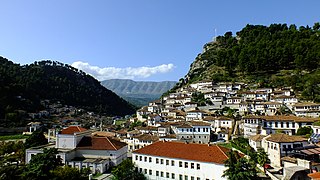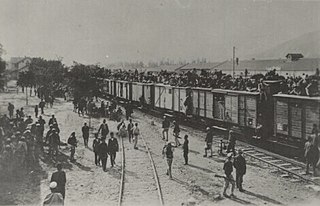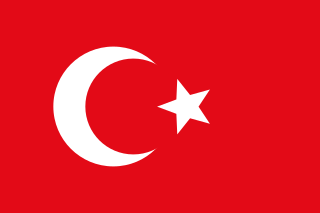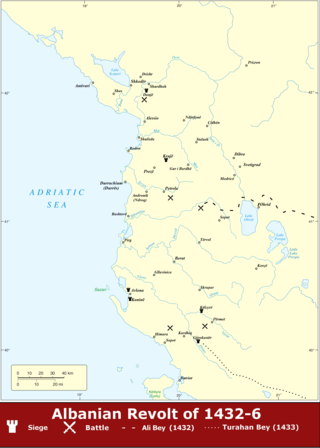
Berat is the ninth most populous city of Albania and the seat of Berat County and Berat Municipality. By air, it is 71 kilometres north of Gjirokastër, 70 kilometres west of Korçë, 70 kilometres south of Tirana, and 33 kilometres east of Fier.
The Albanian National Awakening, commonly known as the Albanian Renaissance or Albanian Revival, is a period throughout the 19th and 20th century of a cultural, political, and social movement in the Albanian history where the Albanian people gathered strength to establish an independent cultural and political life, as well as the country of Albania.

Bajram Curri was an Albanian chieftain, politician and activist who struggled for the independence of Albania, later struggling for Kosovo's incorporation into it following the 1913 Treaty of London. He was posthumously given the title Hero of Albania.

Syreja Vlora (1860–1940), usually referred to as Syrja Bey Vlora, was an Ottoman Albanian politician, an active figure of the Albanian Declaration of Independence in 1912 and one of the delegates of the Assembly of Vlorë.
The Albanian revolt of 1847 was a 19th-century uprising in southern Albania directed against Ottoman Tanzimat reforms which started in 1839 and were gradually being put in action in the regions of Albania.
Zenel Gjoleka (1805-1852) was an Albanian revolutionary fighter born in Kuç of Kurvelesh who participated in rebellions against the Ottoman Empire central authority, being against reforms of Tanzimat.
Hodo Nivica (1809–1852) was an Albanian activist leader known for his role in Albanian revolt of 1847. He was one of the few local leaders that escaped the massacre of Albanian beys. Although invited by Ottoman governor, suspicious of his real intentions he did not go to Monastir. After his participation in the revolt of 1847 he was pardoned by the Sultan. In 1852, together with Zenel Gjoleka he died fighting as a mercenary against Montenegrin forces. His grave is located in the Shpuza, Montenegro.
The Uprising of Dervish Cara was a 19th-century uprising in northern Ottoman Albania directed against the Ottoman Tanzimat reforms which started in 1839 and were gradually being put in action in the regions of Albania. Some historians include the actions in Dibër of the same time under the same historical name, though the events in Dibër were independent and headed by other leaders.
The Albanian revolts of 1833–1839 took place in Albania as a reaction against the new centralizing policy of Ottoman administration.
Xhelil Bega or Çelo Picari (1801–1880) was an Albanian revolutionary leader of the Albanian Revolt of 1847.

The Albanian revolt of 1912 was the last revolt against the Ottoman Empire's rule in Albania and lasted from January until August 1912. The revolt ended when the Ottoman government agreed to fulfill the rebels' demands on 4 September 1912. Generally, Muslim Albanians fought against the Ottomans then governed by the Committee of Union and Progress.

The Peasant Revolt, also known as the Muslim uprising and in Albania as the Central Albania Uprising, was an uprising of peasants from central Albania, mostly Muslims against the regime of Wilhelm, Prince of Albania during 1914. It was one of the reasons for the prince's withdrawal from the country which marked the fall of the Principality of Albania. The uprising was led by Muslim leaders Haxhi Qamili, Arif Hiqmeti, Musa Qazimi and Mustafa Ndroqi. Along with a demand of total amnesty, the rebels required the return of Albania to the suzerainty of the Sultan of the Ottoman Empire.

The Sanjak of Albania was a second-level administrative unit of the Ottoman Empire between 1415 and 1444. Its mandate included territories of modern central and southern Albania between Krujë to the Kalamas River in northwestern Greece.

The Malissori uprising or the Albanian revolt of 1911 was one of many Albanian revolts in the Ottoman Empire and lasted from 24 March 1911 until 4 August 1911 in the region of Malësia.

Haxhi Qamili, born Qamil Zyber Xhameta, was the leader of the 1914–15 revolt in Albania. He was popularly known by his religious name Haxhi Qamili, though he was also known as Baba Qamili.

The Albanian revolt of 1432–1436 was a series of conflicts between Albanian rebels and the Ottoman Empire during the early period of Ottoman rule in the region. Prompted by the replacement of large parts of the local nobility with Ottoman landowners, centralized governance, and the Ottoman taxation system, the population and the nobles, led principally by Gjergj Arianiti, revolted against the Ottomans.
Zylyftar Poda, born Iljaz Poda and also known as Silihtar Boda, was an Albanian leader, who led several revolts against the Ottoman Empire.
Abdyl bej Koka was an Albanian feudal, who played an important role in several Albanian revolts in the 19th century.
Musa Qazimi was an Albanian politician and rebel. A Turcophile mufti, he was first the mayor (1904-1908), then the mufti (1908-1913), and finally the prefect of Tirana (1913-1914). In the turbulent period after the Albanian declaration of independence from the Ottoman Empire, he was first a supporter of the Young Turks, then of Essad Pasha. After he broke with Essad Pasha, he defected and became a leader in the sectarian, reactionary and clerically tinged pro-Ottoman revolt against the new Albanian state's authorities. While the official head of the movement was Haxhi Qamili and the head of its armed forces was Mustafa Ndroqi, Qazimi has been considered to be the ideological inspiration of the movement., and the "real leader" of the uprising. After the revolt was shattered by a makeshift alliance consisting of Mirdita Catholics, local resistance, Kosovar Albanians led by Isa Boletini and some foreign volunteers mainly from Romania, he was found guilty of orchestrating the slaughter that occurred during his revolt against supporters of the Albanian national movement as well as Bektashis and Christians, and he was executed on July 7, 1915.
At the conclusion of the Albanian-Ottoman Wars in the 15th century, the Albanian people revolted against the Ottoman Empire. These actions during this time continued an extended period of conquest and border expansion into Southeastern Europe. The Ottomans were left in control of all the main Albanian cities, besides Durrës and Ulcinj, which were still controlled by the Venice. Albania would be ruled by the Ottomans for over 400 years, but this rule would be frequently disrupted by revolts and uprisings with varying degrees of success.









